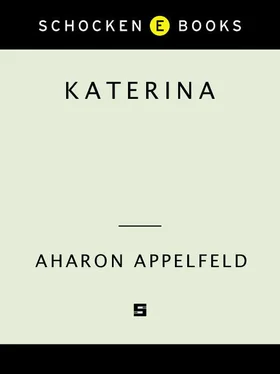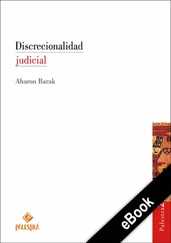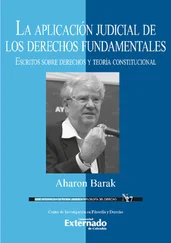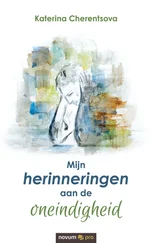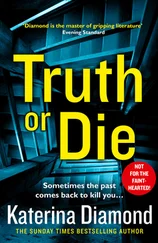Immediately, she ordered me to take all the pots and pans out of the cupboards, to boil a large pot of water, and to prepare sand and lye. Henni shut herself up in her room and didn’t leave it. The old mother was glad that the laws of kashrut weren’t unfamiliar to me, and in her great joy she hugged me and said, “I’m glad I have someone in this world who understands me. My daughter doesn’t. She thinks I’m mad. By your grace, Katerina, you’ll keep watch over the house, and I’ll pay you fully for being on guard. What can I do? Conceits are more important to my daughter than a kosher home.”
For a week we worked to purify the house. At the end of that time, the kitchen was divided into dairy and meat sections, according to the rules. The old mother gave me a banknote worth two hundred and said, “This is a lot of money, but I trust you. My daughter is living in sin, and I can’t do anything about it. Everything she does is only to make me angry. If you keep watch over the kitchen, perhaps the kosher food will kindle good thoughts in her.”
Later, she approached the door of her daughter’s room and called out, “Henni, Henni, I organized the kitchen together with Katerina. I’m going back home. Do you hear me?” No answer was heard. She mounted the coach and set out on her way.
Late at night, Henni came out of her room and said, “That’s it. We’ve survived that steamroller, too.” Just then our eyes met and my soul was bound to hers. That very night she told me that once she and her mother had been close, but in recent years her mother had been seized by religious qualms. Once every two months she would appear like a whirlwind. She was a very strong woman, and the effect of her dreads was strong, too. For some reason, it seemed to her that Henni was about to convert to Christianity.
That night I learned from Henni that Izio wasn’t her husband but a childhood friend with whom she had been living for years. Izio was studying the ancient, marvelous monasteries dispersed throughout Bucovina. With the passing years, he had found pleasure not only in antiquities but also in the monks’ way of life. On the weekends he would return, tired and dusty, like a tramp. That, of course, was merely what met the eye. He was entirely flooded with discoveries and experiences, and his face looked beatific.
I was happy there. The big house was at my disposal, and I strolled along its full length, with music accompanying me in every corner. Sometimes the house seemed like a church to me, where angels soared. When Henni went to Czernowitz, the silence was all my own.
For entire days I was by myself, following the old mother’s orders scrupulously. Henni sometimes joked and told me, “You’re my rabbi, you’re my Bible. Without you, who would know that today was Shavuot?” For the Shavuot festival I prepared cheese and strawberry tart: I remembered how Rosa told me that Shavuot was a white holiday, that the Torah was given on a day that was all light.
My cakes couldn’t sweeten Henni’s sadness. When Henni returned from her trips, she was shattered and her mood was overcast.
“Why aren’t you content? What happened? All the newspapers praised your performance.”
“But I, my dear, know about the flaws. Applause can’t repair deeply rooted flaws.”
“Why do you torture yourself?” I couldn’t restrain myself any longer.
“That’s how I am. What can I do?”
On the weekend, Izio would return from his journeys with a bundle of books at his breast. He looked like one of the monks ambling through silent courtyards with even, full steps. When they reach the northern wall, they strike large wooden mallets to remind their brothers that the hour of prayer has come.
“Where are you going?” I heard Henni’s voice.
Izio’s answer shocked me. “To myself,” he answered, adding nothing.
It was hard for me to understand their life together. Sometimes they seemed to be in love, and sometimes it was as if chance had thrown them together. I, at any rate, kept my promise and observed kashrut . That observance gives me great joy, as though I had returned home to Rosa and the boys.
Afterward, the old mother again descended on the house like a whirlwind. When she had ascertained that all the pots and pans were still in their place, the dairy utensils set apart from the meat utensils, she embraced me and kissed me. Henni, naturally, wasn’t happy. A few days earlier she had returned from the capital tired and once more depressed. Of course, the newspapers praised her playing, but she was contemptuous of them, and now her mother had come, with all her outdated beliefs, all her fears. Because Henni wouldn’t open her door, her mother sat with me and explained the whole affair: “It’s all because of Izio. He corrupted her.”
“He’s a quiet man,” I said in his favor.
“That’s not quiet, it’s madness. He’s in love with monasteries, and I wouldn’t be surprised if one day he converted from the faith of his ancestors.”
Before leaving the house, she told me, “The High Holy Days are coming. Please, be gracious and remind Henni. She’s lost all contact with heaven. She’s completely sunk into herself. May God have mercy on her. She needs mercy very much.”
The seasons passed, year pursued year, and I immersed myself in Henni’s life as though it were my own. I accompanied her when she left, and I loved it when she returned. She used to come back shattered and gloomy, but I also loved her gloom. After a week of agitated sleep, we used to sit for hours. I saw with my own eyes how music was destroying her day by day, how she became intoxicated, vomited, and became intoxicated again. I hadn’t the power to save her.
The disaster, or whatever you care to call it, came from another direction. Izio slumped and clung to the monasteries with a kind of morbid desire. His face changed and a greenish light covered it. The old woman turned out to be right. He went too far. The Christian faith overcame him, and one day he appeared in a monk’s habit.
That very week, Henni sold the house, packed three suitcases and, without a farewell to anyone, left for Czernowitz. She paid me down to the last penny. Before leaving the house, she handed me a packet of jewelry and said, “This is for you. It will be very useful to you.”

9
I WENT BACK TO THE TAVERN. Every time I left a household, I returned to the tavern. I sat by the window and before my eyes, one by one, the sights of the past days appeared to me. Two merchants had bought Henni’s house after brief negotiations. Henni did not bargain hard. More than she sought to sell the house, she sought to rid herself of it. The merchants understood and quickly got her to sign a contract.
After the sale, she burst into tears. The sobbing made her whole body tremble. I wanted to say something, but nothing I could think of was appropriate. I stood like an idiot, and the longer I stood there, the more obvious my idiocy became.
“Make some vegetable soup,” she said to me suddenly.
“I’ll do it right away,” I said, glad she had released me from the shame of silence.
We ate soup, and Henni spoke enthusiastically about the need to escape domineering managers and live a simple life, far from other people, near a forest. It was hard for me to follow what she was saying, but I sensed that she was trying to point to the error that had ruined her life and to warn me against the blindness that drags one, imperceptibly, down to destruction.
The next day Henni was on her way to Czernowitz, and I, bearing two bundles, was without a home, as on the day of my arrival here. I could have gone back to the village. Women of my age used to return to the village, marry, and have children and the slate was wiped clean. Even whores went back and got married and raised children, but I knew that I didn’t belong there, and I didn’t return.
Читать дальше
